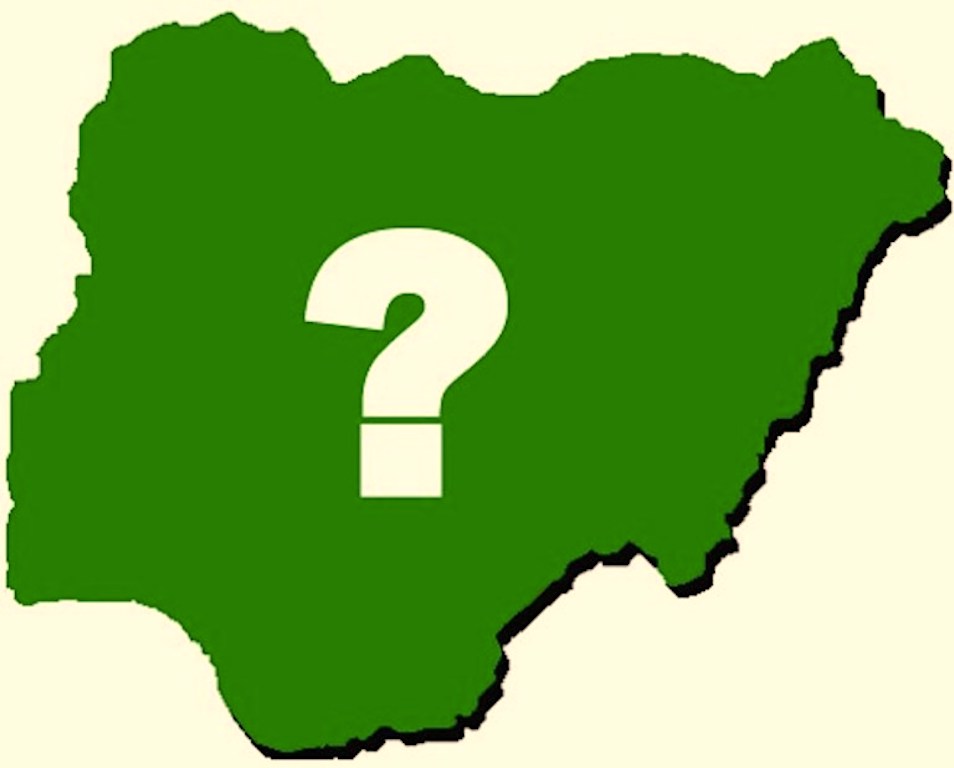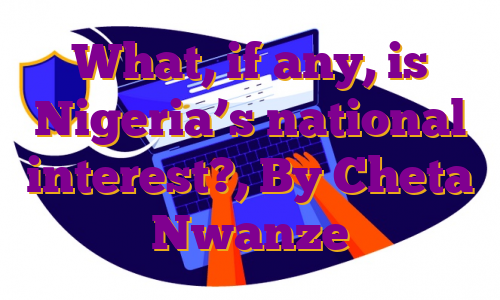

To define our national interest, we have to first understand if Nigeria is a nation, or just a “mere geographical expression”, as we were told by one of our so-called founding fathers. According to the dictionary, a nation is “a large body of people, associated with a particular territory, that is sufficiently conscious of its unity to seek or to possess a government peculiarly its own.”
Anoosheh Ashoori and Nazanin Zaghari-Ratcliffe, two British nationals who have been in detention for four years in one case, and six-and-half years in the second case, have been released by Iran, and as I’m writing this, are preparing to board a plane that will start the first leg of their journey back to the United Kingdom after years of enforced holiday in Iran. The Iranians had been reluctant about releasing them, especially Mrs Zaghari-Ratcliffe, insisting that no negotiation could happen if certain funds seized by Britain were not unfrozen.
These “miraculous” releases are happening at about the same time that Boris Johnson, Britain’s Prime Minister, is landing in Abu Dhabi to talk to the Emiratis about ramping up their oil production to massage oil prices, given that on average now, the cost of a litre of petrol has risen to £1.50 (₦1,178) in his country, and along with rising gas prices, these have gotten a good proportion of the British electorate grumbling. Later today, Mr Johnson would land in Riyadh to talk with the Saudis towards achieving a similar goal.
Note that for years, the Brits have been demonising the Saudis for the gruesome murder of Jamal Khashoggi back in 2018, and other nasty human rights behaviours. They have also taken the United Arab Emirates (UAE) to task for bad behaviour, including an incident back in 2012 when one of Boris Johnson’s predecessors, David Cameron, took Sheikh Khalifa bin Zayed to task over human rights violations.
However, as perhaps Mr Johnson’s most famous predecessor, Winston Churchill said after his first visit to Moscow to meet with the biggest tyrant of the 20th Century, Josef Stalin, “If Hitler invaded hell I would make at least a favourable reference to the Devil in the House of Commons.”
It was in Churchill’s interest to defeat Hitler first, so he parked his loathing of Stalin’s Bolshevism to one side, and made a deal with Stalin. No sooner had Hitler been defeated and taken himself off the mortal coil than Churchill started to warn of the dangers of Bolshevism, and an iron curtain descending over Europe.
Boris Johnson has chosen to park his “concerns” about human rights in Saudi Arabia and the UAE to one side in order to get the oil that his population needs to keep petrol prices down, and for good measure I am certain that a backroom deal has been reached with the Iranians, in order to soften them up for raising their oil output. The Americans, after years of publicly backing Venezuelan dissident, Juan Guaidó, have sent a delegation to speak with Nicolas Maduro about raising the Venezuelan oil output, for pretty much the same reason that Mr Johnson is in the Middle East. The Germans, as we speak, still buy Russian gas, and I am certain that after the war in Ukraine is done and dusted, these same people would reach out to Vladimir Putin to strike a deal if they calculate that he would be a useful ally against a still rising China.
…we know what is the national interest of Western countries, and as a result can calculate how they would behave. I can make a similar description of the national interest of China, Saudi Arabia, and a few other countries that are defined as autocracies, such as the UAE.
Do I hold all of these contradictions against the West?
Definitely not.
Western countries are structured in such a way as to keep the majority of their people as economically prosperous as possible, and maintaining that prosperity is what drives their political calculations. If there is a noticeable drop in living standards, rest assured that both Messrs Biden in the U.S., and Johnson in the U.K., will not be at the top of their countries by January 2025, which in political terms is the blink of an eye from now, so it is in the British (or American) elite’s political interest to bring down energy costs, and do it very fast. Energy costs affect everything, and keeping inflation down is in the national interest. This is where the West has it right. They have successfully created a system where the interest of the political elite aligns with the broader national interest.
So, we know what is the national interest of Western countries, and as a result can calculate how they would behave. I can make a similar description of the national interest of China, Saudi Arabia, and a few other countries that are defined as autocracies, such as the UAE.
China is most interested in preventing social unrest, and almost all of its policy choices are geared towards maintaining both the power of the Communist Party, and preventing the rise of any condition that could lead to the kind of discontent which would lead to social unrest that could lead to regime change. So while China, and indeed Saudi Arabia are autocratic and lean away from Western definitions of human rights, they also find it to be in their interests to provide some form of prosperity for a majority of their people. Again, like the West, the interest of the political elite in both China and Saudi Arabia aligns with the interest of a majority of their people, hence “national interest”, which is the thrust of the question I want to ask, “what is Nigeria’s national interest?”
To define our national interest, we have to first understand if Nigeria is a nation, or just a “mere geographical expression”, as we were told by one of our so-called founding fathers. According to the dictionary, a nation is “a large body of people, associated with a particular territory, that is sufficiently conscious of its unity to seek or to possess a government peculiarly its own.”
How can a country that fluctuates between such extremes with each electoral cycle claim to have a national interest? And if there is no national interest, can such a, err, geographical expression, claim to be a nation?
Does Nigeria meet this definition?
I think we fail on all parts that follow the phrase, “that is sufficiently conscious of its unity”, and therein lies the rub.
You cannot have a national interest if you are not a nation, because you would be pulling in different directions all the time. I will give an example: Under President Obasanjo’s government, there were major privatisations of Nigerian national assets, and a reduction in the size and weight of the government. President Yar’Adua, hand-picked by Obasanjo, came into office, and reversed some of the bigger privatisations, and slowed down others. He then began moves to increase the size of government with such goodies as the Ministry of Niger Delta Affairs, which was added to the already existing Niger Delta Development Commission (NDDC). Then Yar’Adua died and was replaced by Goodluck Jonathan, and privatisations resumed (including that of public electricity corporation, PHCN). Then President Buhari came and, first, privatisations have slowed down, unless you consider the rather ridiculous spectacle of the Central Bank of Nigeria (CBN) buying 21 per cent of the Federal Government’s interest in the Nigerian Security Printing and Minting Company, or the Nigerian National Petroleum Corporation (NNPC) buying 20 per cent of Dangote’s refinery to be privatisation, which I can assure you, they are not. Then those he has been unable to reverse, he has stifled, and has even more aggressively than Yar’Adua (well, he’s had a lot more time), expanded the size and reach of Nigeria’s government. At the very baseline, it shows that in political terms, at least, our interests are different, and wildly oscillate on thw basis of who is in power.
There are some who, looking at the names of the men at the top at the time of these contractions and expansions of the size of government, would say that the Southern political elite are more likely to pursue smaller government and bigger business, while the Northern political elite are more likely to increase the size of government, and constrain business. This argument, though, ignores the statists and crony-capitalists from the South, who have remained a part of Buhari’s government, while he has taken a hammer to private enterprise. It also ignores the fact that perhaps Nigeria’s biggest capitalist is a Northerner. But I think it makes my point that what passes for Nigeria’s national interest is too highly personalised.
How can a country that fluctuates between such extremes with each electoral cycle claim to have a national interest? And if there is no national interest, can such a, err, geographical expression, claim to be a nation?
Cheta Nwanze is a partner at SBM Intelligence.
Support PREMIUM TIMES’ journalism of integrity and credibility
Good journalism costs a lot of money. Yet only good journalism can ensure the possibility of a good society, an accountable democracy, and a transparent government.
For continued free access to the best investigative journalism in the country we ask you to consider making a modest support to this noble endeavour.
By contributing to PREMIUM TIMES, you are helping to sustain a journalism of relevance and ensuring it remains free and available to all.
Donate
TEXT AD: *100% Natural Herbs to finally End Premature Ejaculation & Weak Erection . Click Here for details


(function() {
var _fbq = window._fbq || (window._fbq = []);
if (!_fbq.loaded) {
var fbds = document.createElement(‘script’);
fbds.async = true;
fbds.src = ‘//connect.facebook.net/en_US/fbds.js’;
var s = document.getElementsByTagName(‘script’)[0];
s.parentNode.insertBefore(fbds, s);
_fbq.loaded = true;
}
_fbq.push([‘addPixelId’, ‘756614861070731’]);
})();
window._fbq = window._fbq || [];
window._fbq.push([‘track’, ‘PixelInitialized’, {}]);
!function(f,b,e,v,n,t,s){if(f.fbq)return;n=f.fbq=function(){n.callMethod?
n.callMethod.apply(n,arguments):n.queue.push(arguments)};if(!f._fbq)f._fbq=n;
n.push=n;n.loaded=!0;n.version=’2.0′;n.queue=[];t=b.createElement(e);t.async=!0;
t.src=v;s=b.getElementsByTagName(e)[0];s.parentNode.insertBefore(t,s)}(window,
document,’script’,’https://connect.facebook.net/en_US/fbevents.js’);
(function(d, s, id) { var js, fjs = d.getElementsByTagName(s)[0]; if (d.getElementById(id)) return; js = d.createElement(s); js.id = id; js.src = ‘https://connect.facebook.net/en_GB/sdk.js#xfbml=1&appId=249643311490&version=v2.3’; fjs.parentNode.insertBefore(js, fjs); }(document, ‘script’, ‘facebook-jssdk’));


